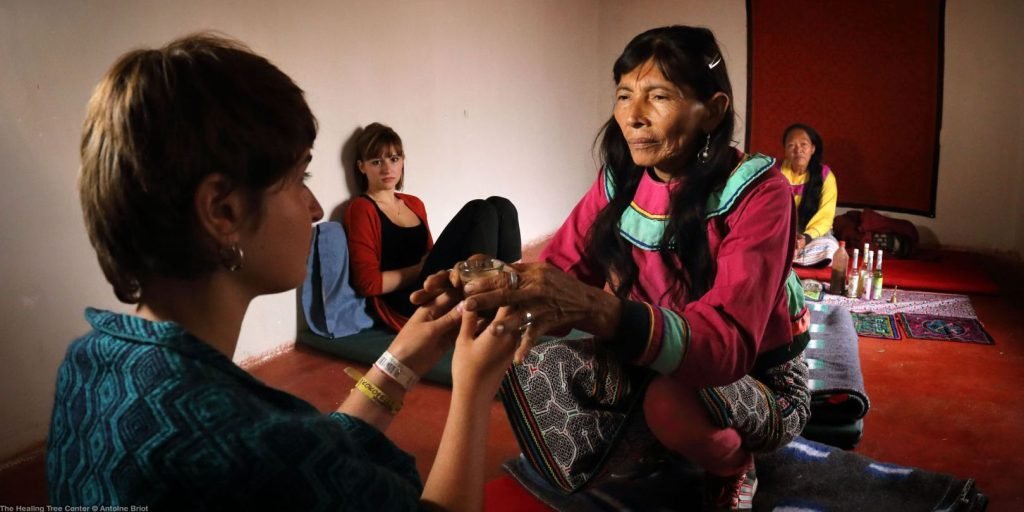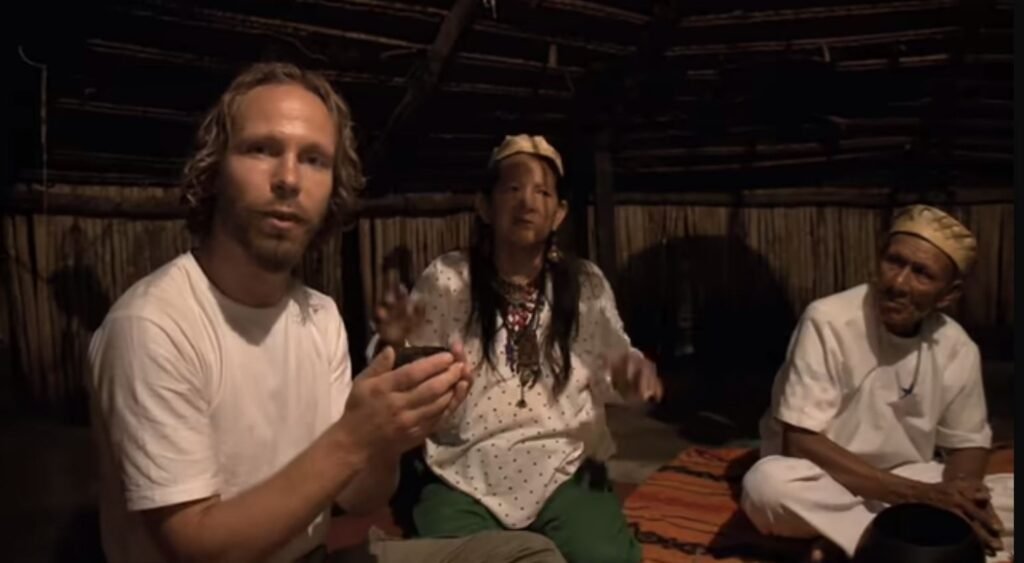The search for well-being and healing has led humanity to explore various medicines and therapies throughout history. Among these, Ayahuasca, a sacred plant used for millennia by the indigenous cultures of the Amazon, has captured the attention of the modern scientific and medical world. The growing demand for effective solutions to mental and physical health problems, combined with the low effectiveness of some conventional treatments, has driven renewed interest in the health benefits of Ayahuasca. In this article, we will explore the various aspects of this powerful ancient medicine and its impact on global health.
What is Ayahuasca?

Composition and Preparation of Ayahuasca
Ayahuasca is a combination of two main plants: the Banisteriopsis caapi liana and the leaves of Psychotria viridis or Diplopterys cabreana. The first contains alkaloids such as harmaline, harmine and tetrahydroharmine, which reversibly inhibit monoamine oxidase (MAO), facilitating the oral bioavailability of DMT (dimethyltryptamine) present in the second plant. DMT is known for its potent psychoactive effects and its ability to activate serotonin receptors, inducing altered states of consciousness.
Ayahuasca Ritual
The use of Ayahuasca is part of complex and sophisticated rituals, with a strong symbolic and ceremonial load. These rituals not only seek physical healing, but also the emotional and spiritual integration of the individual. The ritual structure, which includes phases of organization, symbolization and transcendence, helps to reestablish intrapsychic and social order. It offers a transformative and meaningful experience.
Biological and Neuroscientific Benefits of Ayahuasca

Biological Dimension – Ethnopharmacology
Ayahuasca influences several biological systems, mainly through its psychoactive components that regulate neurotransmitters such as serotonin, dopamine and imidazole. This regulation can improve neuroprotection, modulate the immune system and provide anti-inflammatory effects. These are just some of the health benefits of Ayahuasca.
Impact on the Nervous System
Neurochemical and Metabolic Modifications. Neuroscientific studies have shown that Ayahuasca induces significant changes in the neurochemistry and bioelectricity of the brain. It activates higher brain structures, such as the frontal cortex and the temporal lobe, improving emotional regulation, episodic memory and the generation of visions. In addition, a modulation of the Default Mode Network (DMN) is observed, which can reduce the hyperactivity associated with depression, ADHD and anxiety.
Neuroplasticity and Neural Connections
Increase of the DMN-TPN Connection. Prolonged use of Ayahuasca can increase the interconnection between the DMN and the Task Oriented Network (TPN), facilitating processes of judgment, self-compassion, and meditation. These changes promote neuroplasticity, improving the brain’s ability to reorganize and adapt to new experiences and learning. These effects further underline the mental health benefits of Ayahuasca.
Psychological and Therapeutic Effects

Mental health
Treatment of Mental Disorders
Ayahuasca has shown therapeutic potential to treat various mental disorders. Research has found that not only does it not deteriorate mental health, but it can improve neuropsychological performance and reduce the incidence of psychopathology. In studies with regular users, a lower prevalence of addictions and greater psychological and social well-being have been observed.
Depression and anxiety
Clinical trials have shown that a dose of Ayahuasca can have fast-acting antidepressant and anti-anxiety effects in people with recurrent depression. In controlled studies, participants have reported significant improvements in their symptoms. This highlights the potential of Ayahuasca as a treatment for refractory depression.
Prolonged Effects
Post-Acute Phase and “After Glow”. The beneficial effects of Ayahuasca are not limited to the immediate experience of the ritual. The post-acute phase, known as “after glow”, can last six to eight weeks, during which an elevation of mood and greater emotional openness is observed. This period offers a window of opportunity for additional therapeutic interventions, consolidating long-term psychological benefits.
Spiritual and Cultural Dimension

Connection with the Sacred
For the indigenous Amazonian peoples, Ayahuasca is more than a medicine; It is a spiritual tool that facilitates dialogue with the spirits of plants and the connection with the collective unconscious. Ayahuasca-induced experiences can include archetypal visions and deep spiritual revelations, providing existential and transcendental meaning.
Safety Risks and Considerations
Ayahuasca has a good safety profile in healthy users, not generating addiction or tolerance. However, it is crucial to consume it in controlled and ritual contexts to minimize risks. Some adverse effects, such as nausea and vomiting, are common and considered part of the purification process. It is recommended to avoid its use in people with certain medical conditions and those taking serotonergic medications.
Frequently Asked Questions about the Health Benefits of Ayahuasca

1. What is Ayahuasca?
Ayahuasca is a psychoactive drink traditionally used in spiritual ceremonies by the indigenous cultures of the Amazon. It is mainly composed of the Banisteriopsis caapi liana and the leaves of Psychotria viridis.
2. What are the main active components of Ayahuasca?
The active components of Ayahuasca include the alkaloids harmaline, harmine and tetrahydroharmine from Banisteriopsis caapi, and DMT (dimethyltryptamine) from Psychotria viridis.
3. What are the biological benefits of Ayahuasca?
Ayahuasca can improve neuroprotection, modulate the immune system and provide anti-inflammatory effects. Additionally, it regulates key neurotransmitters such as serotonin and dopamine.
4. How does Ayahuasca affect the nervous system?
Ayahuasca induces changes in the neurochemistry and bioelectricity of the brain, activating higher brain structures and modulating the Default Mode Network (DMN). This can reduce hyperactivity associated with disorders such as depression and anxiety.
5. Is Ayahuasca effective in treating mental disorders?
Yes, studies have shown that Ayahuasca can be effective in treating depression, anxiety and other mental disorders. Improves the psychological and social well-being of users.
6. What are the prolonged effects of Ayahuasca?
The post-acute phase of Ayahuasca, known as “after glow”, can last six to eight weeks, providing greater emotional openness and elevation of mood.
7. What safety considerations should one take into account with Ayahuasca?
It is crucial to consume Ayahuasca in controlled and ritual contexts to minimize risks. Although it has a good safety profile, experts recommend avoiding its use in people with certain medical conditions. Those taking serotonergic medications should also avoid it.
8. Does Ayahuasca cause addiction?
No, Ayahuasca does not generate addiction or tolerance in healthy users.
9. What is the ceremonial context of Ayahuasca like?
The use of Ayahuasca is part of complex and symbolic rituals that seek healing.
Ayahuasca, with its rich history and deep connection to ancient wisdom, offers a holistic approach to healing. This approach encompasses biological, psychological, social and spiritual dimensions. Its therapeutic potential to treat mental disorders, promote emotional well-being, and facilitate experiences of self-transcendence and spiritual transformation positions it as a valuable tool in the integrative medicine landscape. However, it is essential to approach its use with respect, knowledge and in appropriate contexts to maximize its benefits and minimize the risks. The health benefits of Ayahuasca are vast and varied, highlighting its ability to address complex problems from an integrative and holistic perspective.

Discover the unmatched Health Benefits of Ayahuasca through a transformative journey with Lorenzo Expeditions! Immerse yourself in the ancient ancestral traditions of the Amazon and explore the vast healing potential of this ancient medicine from authentic indigenous communities.
Don’t miss this unique opportunity to explore the ancestral secrets of ayahuasca in an authentic and guided way. Book your spot on our next Ayahuasca Retreats tour today and let us take you to discover this ancient healing tradition in its natural surroundings.





